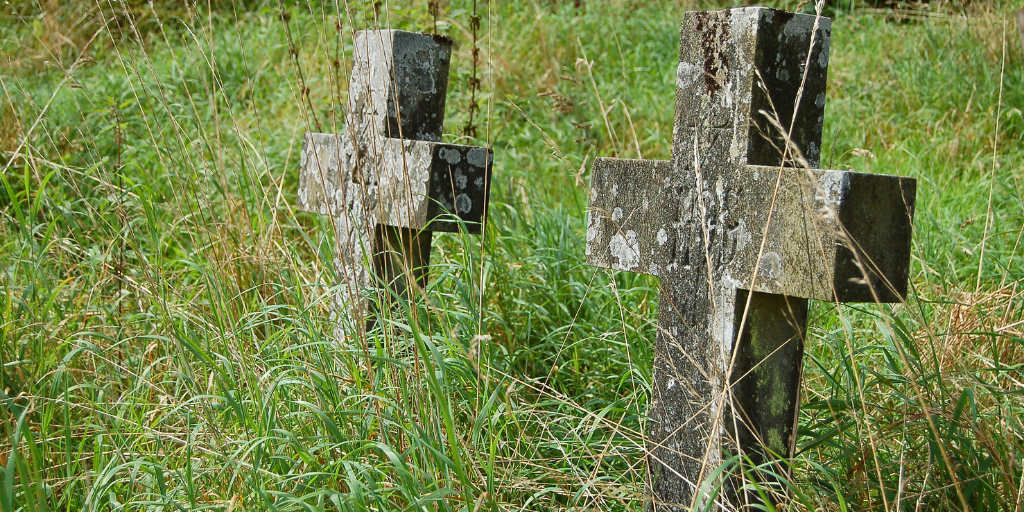
Last week my husband’s aunt died and I was asked to select something to read for her non-denominational memorial service. In preparation and also because this is the Year of Faith, I turned to the Catechism to rediscover what the Church teaches us about “Death.”
The actual Catechism contains many references to Death; just the broad index headings read: after death, as limitation of earthly life, Christian dealings with death, Christian interpretation of death, death of Jesus, and separation of soul and body.
Considering how many references are made to Death, I opened up the YouCat, a recent publication of the Catholic Catechism in a Q&A format targeting young people. Here I found:
“How does Christ help us at our death, if we trust in him?
Christ comes to meet us and leads us into eternal life. “Not death, but God will take me” (St. Therese of Lisieux.) [1005-1014, 1016, 1019] Someone who dies, trusting in God and at peace with men, and thus without serious sin, is on the way to communion with the risen Christ. Our dying makes us fall no farther than into his hands. A person who dies does not travel to nowhere but rather goes home into the love of God, who created him. “
I love the idea that in dying we fall into Christ’s waiting, outstretched arms; that our loved one does not simply cease to exist, but is at home in the love of God. It has a beautiful imagery to which all people, young and old, can relate.
I turned back to the CCC referenced by the YouCat entry, Dying in Christ Jesus. Death is the end of earthly life. (CCC 1007) Death is a consequence of sin. (CCC 1008) and Death is transformed by Christ. (CCC 1009).
What’s that? Death is a consequence of sin? Reading on, I learn that the church teaches us “death entered the world on account of man’s sin. Even though man’s nature is mortal, God had destined him not to die. Death was therefore contrary to the plans of God the Creator and entered the world as a consequence of sin.” (CCC 1008)
This sounds so punishing, so shameful. The original sin of Adam and Eve brought us suffering and death not original to God’s plan for us? It’s almost depressingly sad. Still, fear not, because “Jesus, the Son of God, freely suffered death for us in complete and free submission to the will of God, his Father. By his death he has conquered death, and so opened the possibility of salvation to all men.” (CCC 1019)
Because of Christ, Christian death has positive meaning. (CCC 1010) In death, God calls man to himself. (CCC 1011) Death is the end of man’s earthly pilgrimage, of the time of grace and mercy which God offers him so as to work out his earthly life in keeping with the diving plane, and to decide his ultimate destiny.” (CCC 1013) In the Roman Missal, Preface of Christian Death I we read, “Lord, for your faithful people life is changed, not ended. When the body of our earthly dwelling lies in death we gain an everlasting dwelling place in heaven.” (CCC 1012)
Upon reading this passage, I knew that I should read from the Holy Gospel According to John 14: 1-6 “Jesus said to his disciples: “Do not let your hearts be troubled. You have faith in God; have faith also in me. In my Father’s house there are many dwelling places. If there were not, would I have told you that I am going to prepare a place for you? And if I go and prepare a place for you, I will come back again and take you to myself, so that where I am you also may be. Where I am going you know the way.” Thomas said to him, “Master, we do not know where you are going; how can we know the way?” Jesus said to him, “I am the way and the Truth and the Life. No one comes to the Father except through me.”
In dying we fall into the arms of Christ Jesus, who waits to carry us home to the love of God.
Copyright 2012 Shelly Kelly
About the Author

Shelly Henley Kelly
Shelly Henley Kelly is a wife, mother of three, and native Texan who writes and records a podcast with her sister on Of Sound Mind and Spirit. When not writing or recording, Shelly can be found keeping the scorebook at her son’s baseball games, diving deep into historical research, or hiding with a good book in between games.


.png?width=1806&height=731&name=CatholicMom_hcfm_logo1_pos_871c_2728c%20(002).png)
Comments